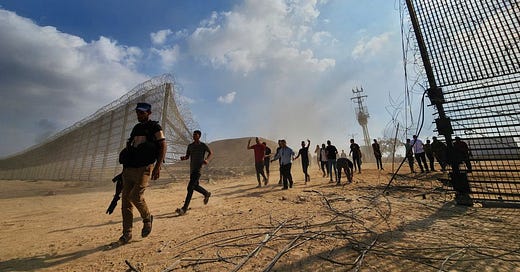How Israel Got Ambushed

Hamas terrorists break through the Israeli side of the fence in Gaza City on Saturday. (Photo by Hani Alshaer via Getty Images)
The country’s world-famous defenses failed on four levels. The worst was underestimating the enemy.
62
Since 2011, Israel’s vaunted Iron Dome has saved countless lives and made its citizens feel safe under its security blanket. But that feeling of security was shattered on Saturday, when close to 1,000 Hamas fighters, armed to the teeth with assault rifles, explosive devices, and RPGs, penetrated Israel in a surprise ground attack that breached multiple …
Enjoying the story?
Enter your email to read this article and receive our daily newsletter.
Already have an account?
Sign In


